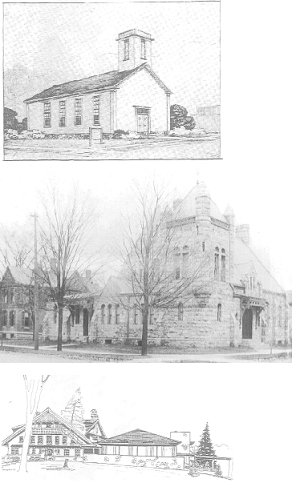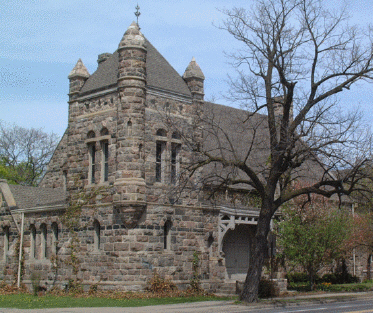Our Story (History written in 2015, by Timothy F. Richards) | Our Ministers- Slide Show | Our Historic Buildings | Our 150th Anniversary (2014-15)
Additional materials on our history...
An Ann Arbor Tradition Since 1865
In the late 1800s the First Unitarian Society was well known in the Ann Arbor area for its reading room and lending library at a time when Ann Arbor had no public library. The church was known for bible classes catering to university students. Early Unitarians here worked to eliminate poverty and illiteracy among the American Indian population.
An early minister Jabez T. Sunderland and his wife Eliza Sunderland were very involved in religious and intellectual life  in the community. In 1896 Sunderland traveled to the Khasi Hills in India to establish ties with a group of Unitarians there. Our congregation continues this long relationship with the Khasi Hills Unitarians. In 1894 graduate students at the University of Michigan organized a petition to have women appointed to faculty and, in particular, to have Eliza Sunderland made Assistant Professor of Philosophy. Although the petition was not successful, she continued in an informal role at the university and became a nationally-known figure. She also spoke at the World Parliament of Religions in 1893, representing all Unitarian women of America.
in the community. In 1896 Sunderland traveled to the Khasi Hills in India to establish ties with a group of Unitarians there. Our congregation continues this long relationship with the Khasi Hills Unitarians. In 1894 graduate students at the University of Michigan organized a petition to have women appointed to faculty and, in particular, to have Eliza Sunderland made Assistant Professor of Philosophy. Although the petition was not successful, she continued in an informal role at the university and became a nationally-known figure. She also spoke at the World Parliament of Religions in 1893, representing all Unitarian women of America.
During the Great Depression minister Harold P. Marley had strong ties to the labor movement and a labor newspaper was published at the church. Early organizing meetings of the UAW were held at the church as well. During World War II Reverend Marley established a "Wayside Pulpit" in Ypsilanti to provide child care and playgrounds for children of families helping to build the Willow Run B-24 bomber plant. In 1933, congregant Roy Wood Sellars drafted the first version of the Humanist Manifesto, signed also by Rev Marley.
During the McCarthy Era in the 1950s, the First Unitarian Church provided a safe haven for liberal discussion and the minister, Ed Redman, was frequently called upon to testify on behalf of students and faculty members under investigation. In the sixties, minister Erwin Gaede was strongly committed to the civil rights movement and anti-Vietnam War groups.
In the 1980s and 1990s minister Kenneth W Phifer and members of the congregation supported gay/lesbian/transgender rights. In 1988, the congregation took in and for many years supported a Sanctuary family from El Salvador. During Dr. Phifer's ministry the congregation more than doubled its membership and in 1999 completed construction of the present church that has room to house the many activities of the UUAA community.
This congregation continues to play a vital role in the community by volunteering for Interfaith Hospitality Network (Alpha House), partnering with a coalition of churches to build Habitat for Humanity houses, playing a major role in the annual CROP Hunger Walk, providing food donations to local food banks, and collecting and sending books to a prison library program to name only some of our social justice projects..
 Click to see photos and information about our historic buildings...
Click to see photos and information about our historic buildings...

